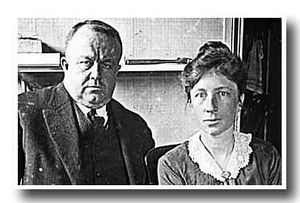Lillian Moller Gilbreth
- Birthdate
- 1878/05/24
- Birthplace
- Oakland, California
- Death date
- 1972/01/02
- Associated organizations
- University of California, Berkeley, National Academy of Engineering, American Society of Mechanical Engineers, Bryn Mawr, Rutgers, Purdue
- Fields of study
- Psychology, Mechanical Engineering, Human Factors Engineering, Ergonomics
- Awards
- Medal of the American Society of Civil Engineers, twenty honorary degrees, female psychologist in the United States to receive a postage stamp in her honor
Biography
Lillian Moller Gilbreth was a distinguished industrial psychologist and mechanical engineer. She is best known for her study on scientific management principles. [1]
Born May 24th 1878 in Oakland, California, to parents of German descent, Lillian Moller grew up as a shy girl. The oldest of nine children, Moller was known to be a very introverted child. As a result, she was educated by her parents and tutors at home until the age of 9, when she entered public school. While academically strong, her timid nature made her unpopular among the other students. Despite this, she graduated with high marks in school as the Vice President of the senior class. [2].
Her traditionalist was against higher education for women, but Moller was able to convince him to allow her to study literature and music at the University of California. While attending college, she was required by her father to stay home and maintain her family duties. She obtained her B.A. in literature in 1900, and was the first woman to speak at the University of California commencement [3].
Moller wanted to study at Columbia University in New York with Brander Matthews, but he would not allow women to attend his lectures. E.L. Thorndike allowed Moller into his psychology program at Berkeley. After returning to California due to sickness, then returning back to Berkeley to complete her education, she received her M.A. in literature in 1902[4].
Furthering her education and completing one year of Ph.D studies, which included a minor in psychology, Moller took a summer trip to Europe with Minnie Bunker. Bunker introduced Moller to her cousin Frank Gilbreth when the group stopped in Boston en route to Europe. There was instant connection between the two, and they soon married on October 19th, 1904. They went on to have 12 children. [5]
After marriage, both found themselves to be very happy together, stimulated by their passions relating to their work. Frank, was a wealthy and prominent owner of a construction company, and wanted Lillian to apply her knowledge of psychology to his work. To that end, Lillian changed her major from English to psychology so that after obtaining her Ph.D, she could help her husband in his company. Eventually the couple moved to Rhode Island in 1910, where she obtained her doctorate in 1915. Her dissertation, Psychology of Management was published in 1914 and stressed the psychological aspects of industrial management. Today, as a result of the paper, she is considered a pioneer in what is now known as organizational psychology. [6]
Where Frank was interested in the technical aspect of worker efficiency, Lillian was concerned with the scientific human component of time management. She recognized that workers are motivated by indirect incentives like money, as well as direct incentives, like job satisfaction. Working with Frank, she created job standardization, incentive wage-plans, and job simplification. She was also the one of the first to study and recognize the effects of fatigue and stress on management. [7]
In addition to making these contributions, Lilian and her husband furthered their research by applying their productivity methods to the household. They conducts many experiments, including the detailed analyses of motions to help find faster and more efficient ways to wash dishes, brush teeth, and preform other such tasks. As a result of their heavy experimentation in family life, Ernestine Gilbreth Carey and Frank Bunker Gilbreth Jr., both daughter and son of the Frank and Lilian, chronologically recorded the events into the well known children's book Cheaper by the Dozen[8].
Frank suffered from a fatal heart attack in 1924. Lillian, continued to provide for her family by herself. She became the first female professor in the engineering school at Purdue University, the first woman elected to the National Academy of Engineering, the second woman to join the American Society of Mechanical Engineers, and served as a trainer in management at Bryn Mawr, Rutgers, and Purdue. After her obtaining her position in Purdue University in 1935, she retired in 1948 at the age of seventy. [9]
After retirement she did not stop her career as a consultant and continued to work with GE and other firms to improve the design of kitchens and household appliances. She also created new techniques to help disabled women accomplish common household tasks. During the great depression, she was consulted by President Hoover to launch the successful "Share the Work" program, assisted as an adviser for the Government in WWII who oversaw the factories producing needed, and invented shelves within refrigerator doors and the foot-pedal garbage can [10]
In 1966, she went on to win the Hoover Medal of the American Society of Civil Engineers, and continued to win twenty honorary degrees. She was also the first female psychologist in the United States to receive a postage stamp in her honor in 1984. Lilian passed away on January 2, 1972. [11]
References
- ↑ https://www.sdsc.edu/ScienceWomen/gilbreth.html
- ↑ http://www.feministvoices.com/lillian-gilbreth/
- ↑ https://www.sdsc.edu/ScienceWomen/gilbreth.html
- ↑ http://www.feministvoices.com/lillian-gilbreth/
- ↑ http://www.feministvoices.com/lillian-gilbreth/
- ↑ http://www.feministvoices.com/lillian-gilbreth/
- ↑ https://www.sdsc.edu/ScienceWomen/gilbreth.html
- ↑ https://www.asme.org/career-education/articles/management-professional-practice/lillian-moller-gilbreth
- ↑ http://www.feministvoices.com/lillian-gilbreth/
- ↑ http://www.feministvoices.com/lillian-gilbreth/
- ↑ https://www.asme.org/career-education/articles/management-professional-practice/lillian-moller-gilbreth
